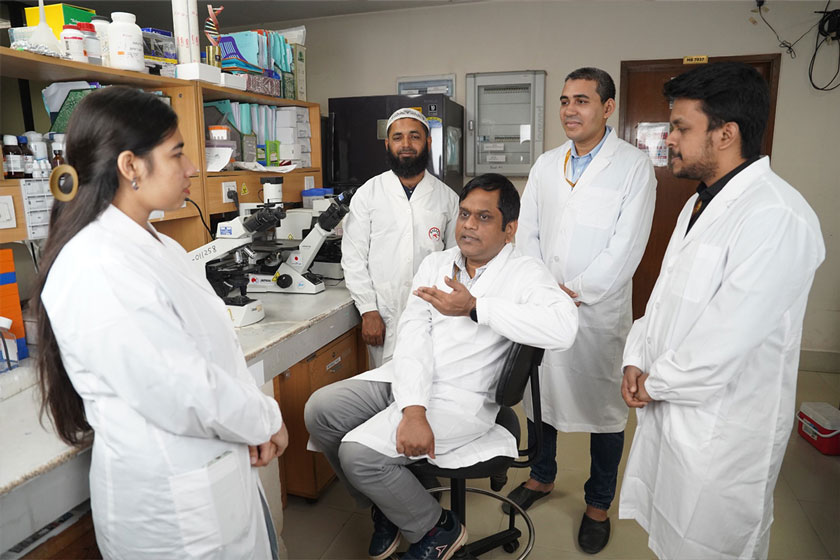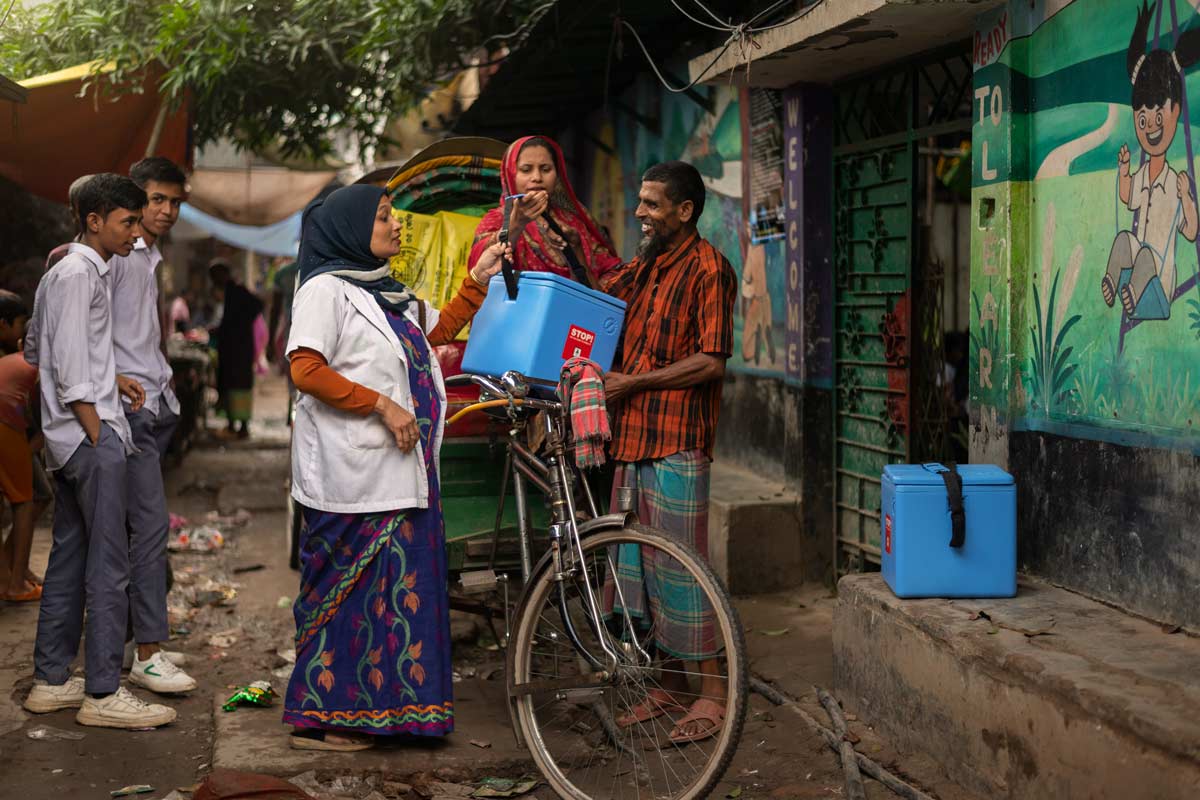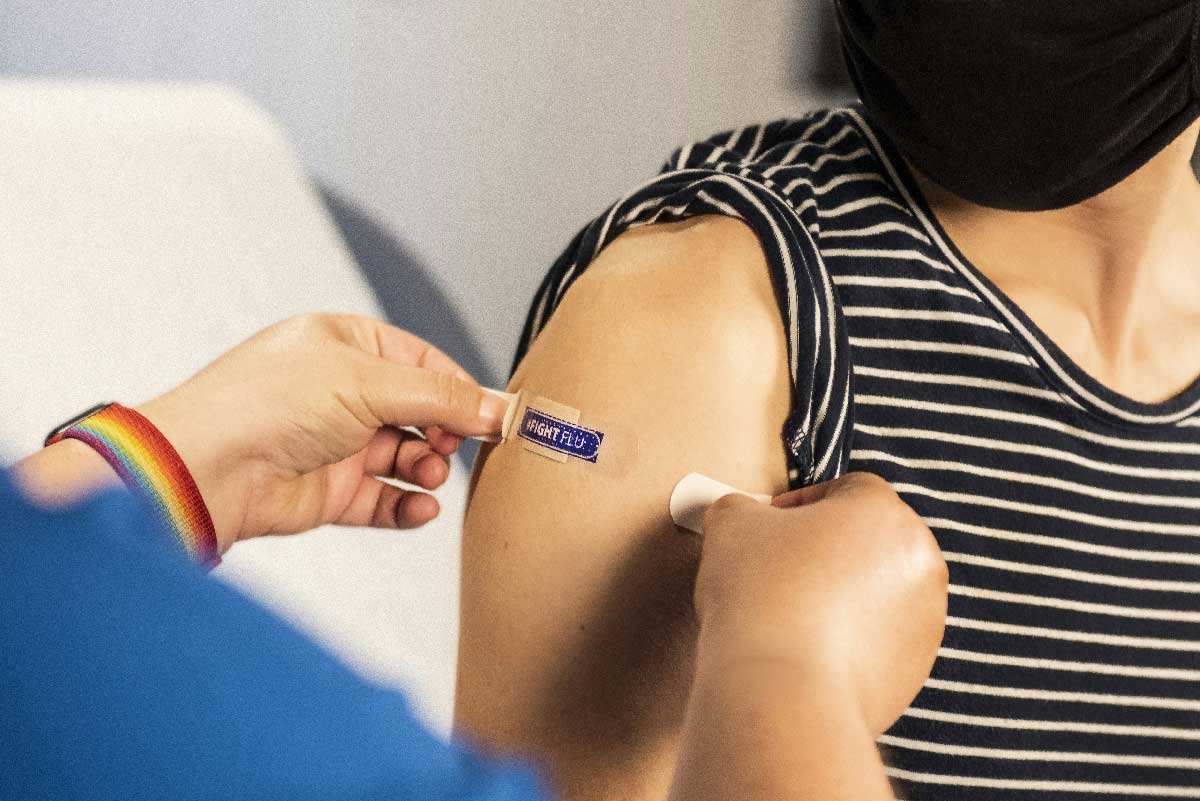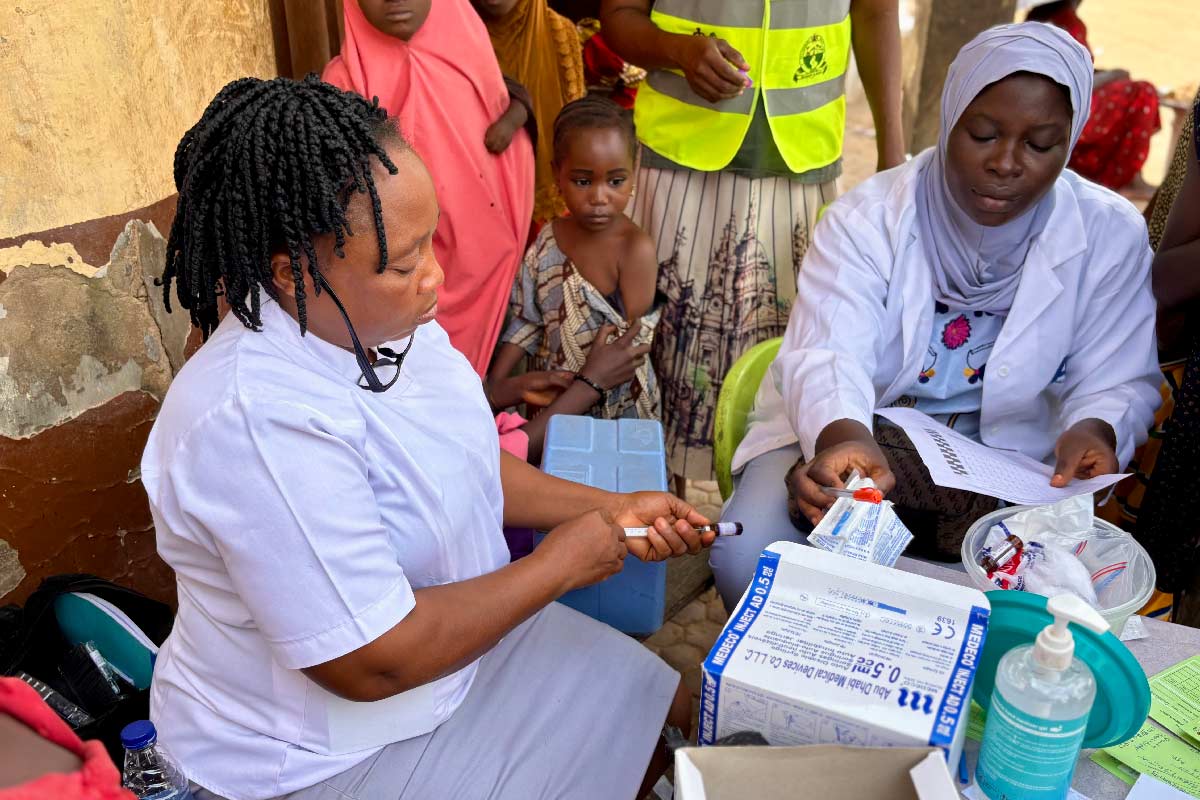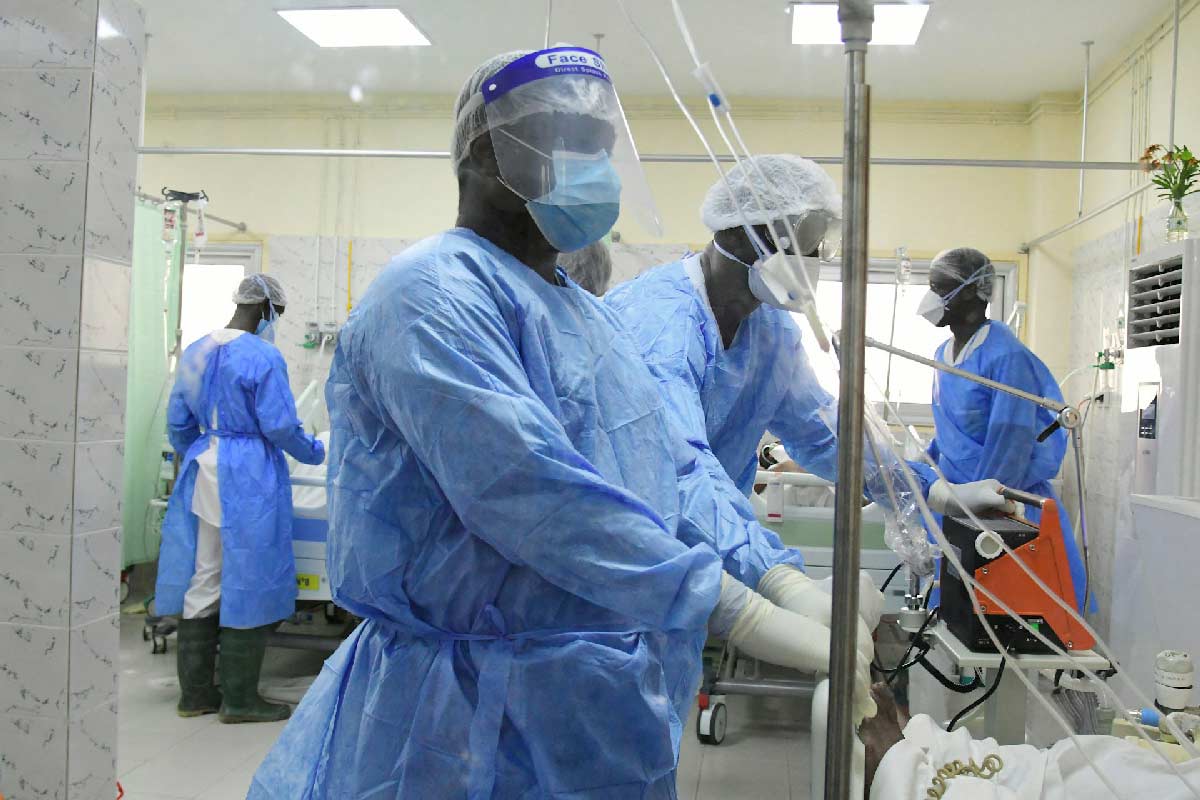The 'Pink Man' of Bangladesh and his battle against female cancers
Breast and cervical cancers account for nearly a third of all cancer diagnoses in Bangladeshi women – and mortality rates have been way higher than Dr Habibullah Talukder Ruskin is willing to accept.
- 2 July 2025
- 5 min read
- by Mohammad Al Amin

Dhaka physician Dr Habibullah Talukder Ruskin has earned an unusual moniker: he’s known as the “Pink Man of Bangladesh”.
The nickname – ceremonially conferred upon him by the World Cancer Society of Bangladesh in October 2024 – is a hat-tip to his three-decade long fight against breast and cervical cancer, diseases which account for almost a third of all cancers diagnosed in Bangladeshi women.
“People are suffering. How can I help?”
Dr Ruskin currently serves as a professor and project coordinator at Gonoshasthaya Community-Based Cancer Hospital, having previously worked as the head of the department of cancer epidemiology at the government-run National Cancer Research Institute and Hospital (NCRIH), which he first joined in 1993.
“At first I was assigned to provide service in the breast cancer unit of the hospital,” Dr Ruskin told VaccinesWork. “During that time, we were struggling with lack of adequate facilities there to provide the proper treatment. Then I thought -- how I can work to prevent the cancer disease? People were suffering due to lack of treatment.”
Since October 2023, the cervical cancer-blocking human papillomavirus (HPV) vaccine has been publicly available to girls aged 10 to 14, with an impressive 5.6 million of that cohort reached during the introductory campaign. But vaccinating against cancer was not an option for older generations, for whom screening and early detection were the only avenues of prevention available. And those important tools, Dr Ruskin found, were not being deployed nearly regularly enough.
The young doctor made sure he completed all specialised education on preventive care, and then got to work convincing the government health authorities to start building awareness of cancer control in the community. That work broadened his experience of his native country, he says: “At one stage, being assigned by the government, I led a programme of the World Health Organization to build awareness among community leaders, and visited 30 districts to this end in 2002,” he said.
That year, Ruskin decided more needed to be done, and he established a non-profit organisation called the Bangladesh Cancer Foundation (BCF). BCF’s mandate was to carry out screening for cancers and pre-cancers, and to carry on spreading awareness to the at-risk members of the population. Catching cancers early, he knew, would make it more likely that treatment would prove effective, reducing the high mortality rate among affected women.
“The foundation started to observe Breast Cancer Service Week, to provide services to the breast cancer patients in a particular week, for the first time in Bangladesh, the same year.
“The BCF provided clinical breast examination, consultation and counselling services with demonstration of self breast examination. This service was provided for a week initially. And [in 2006] we started to implement the same programme throughout October month.”
The foundation reached out to women and girls across the social gamut: in the garment industry, in university halls, in schools and colleges. “We collected donations from members of the foundation and friends and relatives to spend money for programmes.”
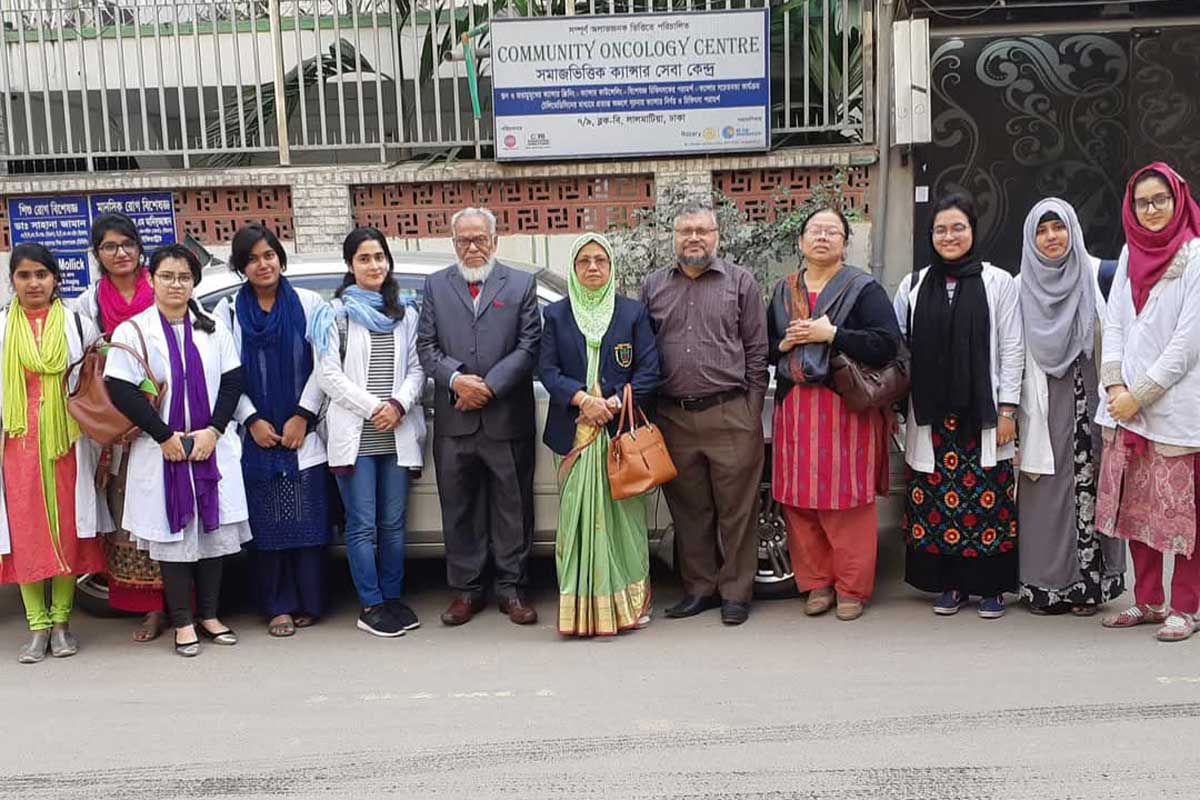
Pink road show
But preventive medicine works best when it happens at great scale. In 2013, Ruskin set up a new entity – the Bangladesh Breast Cancer Awareness Forum (BBCAF). An alliance of 14 different organisations, the BBCAF set out to make waves, declaring 10 October as Breast Cancer Awareness Day, and convening the inaugural instalment under bright pink banners.
“In the first four to five years, the day’s observance was limited to the capital. But since 2017 the programme has spread all over the country. Now 49 organisations are members of the forum,” Ruskin said.
“We also provide overall cancer related programmes like national conferences, seminars, symposiums. I work as the chief coordinator of the forum. Now a “Pink Road Show” is observed in different programmes – wearing pink dresses and caps helps build awareness among people.”
Cervical cancer screening has been part of the BCF’s mission since 2003, Ruskin said, with a Cervical Cancer Service Week launched for the first time in Bangladesh in January of that year under teal-coloured banners. In 2016, his group launched “March for Mother”, a cervical cancer awareness rally on the second Saturday of each new year.
Today, BCF has adopted “WHO’s new programmes for elimination – the 90-70-90 targets”, he said, describing the percentage targets for vaccination of girls, screening of women by age 35 and 45, and treatment of women with pre-cancers. “We are also carrying out advocacy programmes, hold seminars also for doctors, policymakers and mass people.”
Ruskin said his team established the Community Oncology Centre (COC) in 2018, to spread the cancer services to the masses. The programme brings leaders from villages on board, training them on symptoms and places where treatment and screening is available, to make them a node of information spread in their communities.
“Under this centre, we have set up virtual satellite clinic. We are also working to convince all private and community hospitals to link up with the Community Oncology Centre.”
Have you read?
Prevention is the best policy
Shipra Gomes, Staff Nurse at the BCF and COC explained, “the Bangladesh Cancer Foundation and the Community Oncology Centre now work under same roof. When patients come, we fill up form with information about their previous records. Then our doctor advises them, and we counsel them in the centre.”
They also organise campaigns outside Dhaka city to build awareness, carry out screening and provide necessary counselling to cancer patients she added. Ruskin remains very actively in the lead.
Talking to VaccinesWork, Dr Asadzzaman Biddut, Associate Professor, Medical Oncology at the NCRIH, said: “Habibullah Talukder Ruskin is playing a great role in controlling the cancer diseases in Bangladesh – as prevention is the best policy to control the diseases.”
Professor Dr Syed Zakir Hossain, Line Director (NCDC) of Directorate General of Health Services, said “Building awareness and carrying out screening plays a major role in fighting against the cancer diseases. In this country, the government and non-government organisations are working to build awareness among people about cancers.”
